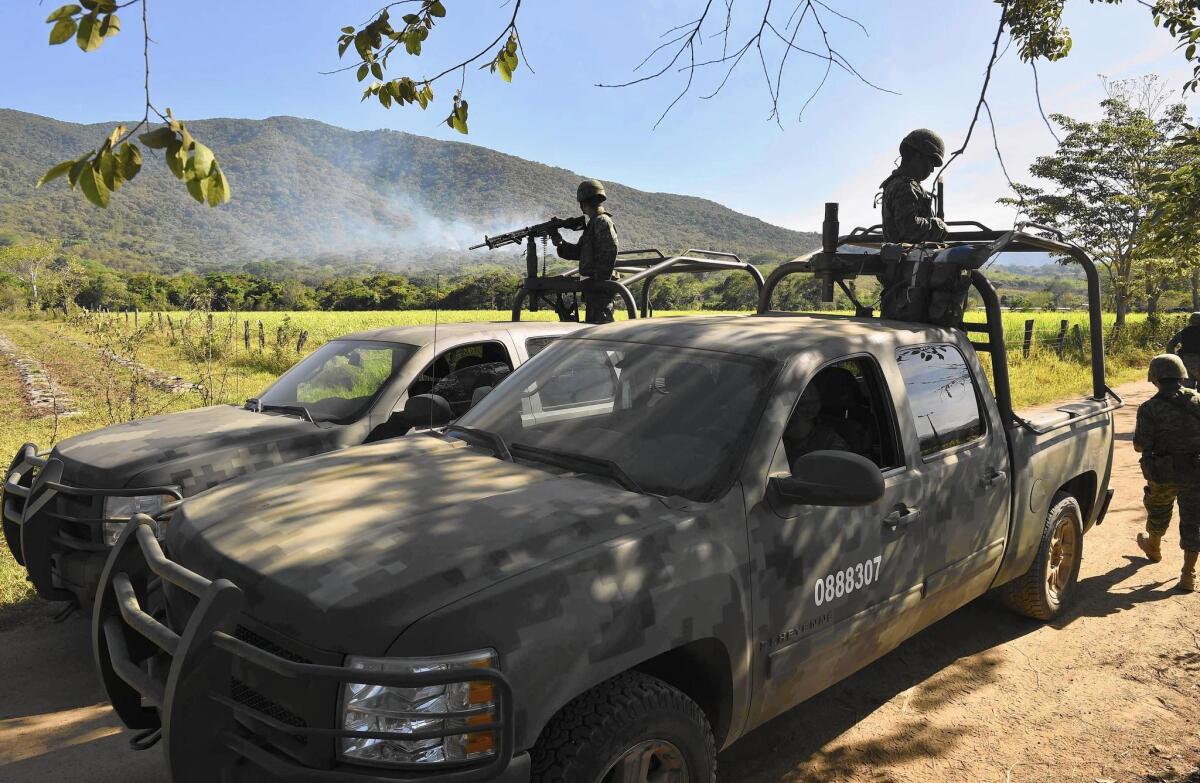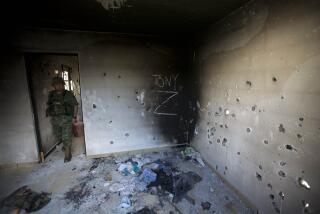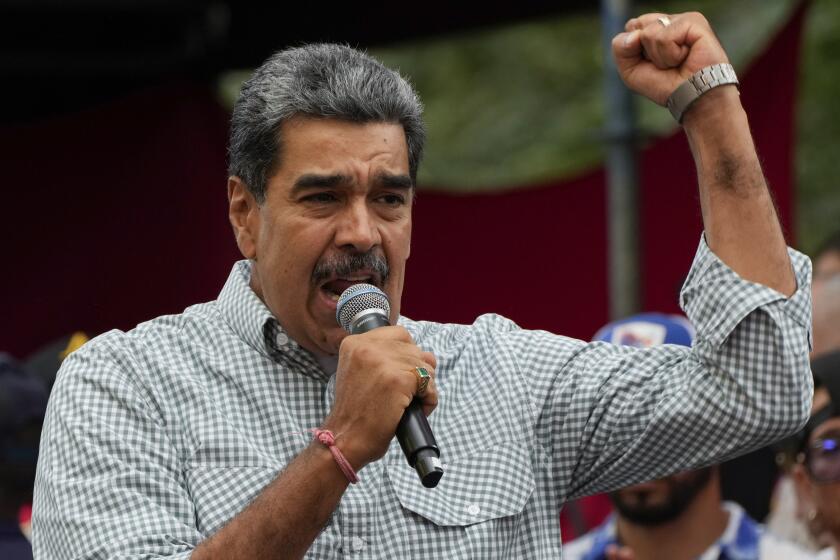Mexico drug violence intensifies as elections approach

Soldiers stand guard after drug traffickers shot down a military helicopter in Villa Purificacion, Mexico, on May 2.
A month before national elections, Mexico is witnessing a level of violence in which drug traffickers have directly confronted the army, raising questions about whether the government’s progress in combating crime might be a hollow victory.
In an apparent first for the nation, a drug cartel in the prosperous state of Jalisco used rocket-propelled grenades to shoot down a military helicopter, killing at least six soldiers.
The attack Friday was part of a wider assault in Guadalajara, Mexico’s second-largest city; Puerto Vallarta, a tourist destination popular with Americans and Canadians; and nearby points. The daylong mayhem included the burning of banks and gasoline stations and the erecting of nearly 40 roadblocks using flaming vehicles.
A total of 15 people, including the soldiers, died, a dozen were injured and 19 were arrested.
Defense Secretary Gen. Salvador Cienfuegos referred to the killers in Guadalajara, the state capital, as unpatriotic commissioners of vile acts. “We will not let our guard down,” he said this week.
Guadalajara, a metropolitan area of more than 4 million people, had long been relatively free of the kind of violence besetting Mexico elsewhere, in part because it is home to the families of kingpins.
But the spasm of bloodshed last week highlighted the emergence of yet another drug cartel, little noticed compared with larger organizations that nevertheless have suffered recent setbacks.
The government of President Enrique Peña Nieto has killed or captured major drug lords in its 21/2 years in office, including the most-wanted fugitive Joaquin “El Chapo” Guzman, detained last year, and Servando “La Tuta” Gomez, head of Michoacan state’s notorious gang operations, caught this year.
But those victories have given way to other organizations that have grown in the void.
With the fracturing of the Sinaloa and Zeta cartels, the country’s most prominent, the New Generation of Jalisco quietly moved into preeminence, taking advantage of Jalisco state’s geographical advantage on the west coast and its position as a business and industrial hub. The group is believed to be behind the downing of the military helicopter.
The New Generation of Jalisco “is a criminal group with very significant firepower,” said Monte Alejandro Rubido, national security commissioner. “This undoubtedly has a very special connotation.”
It is rare for drug cartels to confront the military head-on, and army commanders were furious about the attack. It is also virtually unheard of that cartels would use arms the level of rocket-propelled grenades.
“The magnitude of the attacks was spectacular,” security expert Eduardo Guerrero said in El Financiero newspaper, noting they came as the government launched Operation Jalisco, designed to rein in the traffickers.
It is now likely that the military will launch a full-scale offensive against the Jalisco gangsters.
“A very difficult time approaches in Jalisco,” Alejandro Hope, a former intelligence analyst, wrote in El Universal newspaper.
Although not at the same level of violence as other regions of Mexico, such as Guerrero or Michoacan, Hope said, the outbreak in such an important state is worrisome to many, including the U.S. government, which issued a warning Tuesday against travel in Jalisco and other places.
The Mexican Foreign Ministry responded tersely to that warning, saying the government had taken steps to strengthen security in Guadalajara and other parts of the state.
Mexico will hold midterm elections June 7 for numerous state governors, mayors and congressional members. But violence in many regions has threatened the vote. Candidates have been slain, others have said they are too afraid to campaign, and election officials have said they cannot set up ballot stations in some states because of dangers.
The panorama stands in marked contrast to what the Peña Nieto government has sought to portray, saying that the homicide rate has declined. Those statistics remain in dispute, and rates for other crimes, like kidnapping and extortion, are still high.
Twitter: @TracyKWilkinson
More to Read
Sign up for Essential California
The most important California stories and recommendations in your inbox every morning.
You may occasionally receive promotional content from the Los Angeles Times.











